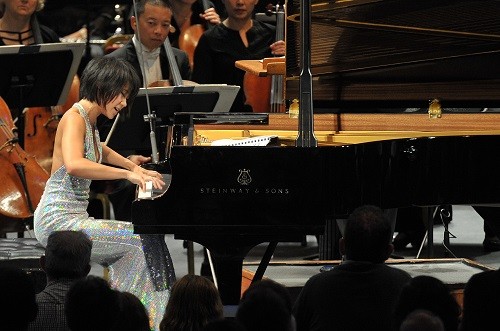 United Kingdom BBC Prom 61 – Ives, Bartók, Beethoven: Yuja Wang (piano) San Francisco Symphony’/ Michael Tilson Thomas (conductor), Royal Albert Hall, London, 31.8.2015. (RB)
United Kingdom BBC Prom 61 – Ives, Bartók, Beethoven: Yuja Wang (piano) San Francisco Symphony’/ Michael Tilson Thomas (conductor), Royal Albert Hall, London, 31.8.2015. (RB)

Ives: A Symphony: New England Holidays – Decoration Day
Bartók: Piano Concerto No. 2
Beethoven: Symphony No. 3 in E Flat ‘Eroica’ Op 55
This was the second of two concerts given by Michael Tilson Thomas and the San Francisco Symphony at the Proms. All of the works on the programme for this concert pushed at the boundaries of what was musically possible at the time they were written.
MTT and the SFS have recently been exploring works by ‘American Mavericks’ and the first composer on the programme, Charles Ives, certainly falls squarely into this category. Ives’ Symphony ‘New England Holidays’ memorialised four traditional American holidays, one for each season of the year. Ives specified that each of the four movements could be performed separately or together as a complete symphony and the second movement – Decoration Day – was a good choice for opening the concert. MTT and the SFS did an excellent job evoking the fragmentary dreamscape of the opening and in allowing the threads of sound to coalesce and build. There was something very unsettling about this opening section but also a warmth and humanity which was reinforced as we heard fragments from famous hymns and marches. In the final section the SFS’s brass and percussion did a magnificent job transforming themselves into a triumphant marching band. The final bars of the piece had a gossamer like delicacy as we heard strings and bells breathe their final benediction.
Yuja Wang joined MTT and the SFS for the Bartók Second Piano Concerto widely regarded as the most technically demanding concerto in the standard Classical repertoire. This was the second time Wang has performed the work at the Proms so I was slightly disappointed to see that she was still using a score (although to be fair many pianists do use scores when they are playing very complex music like this). Wang was on top of the fiendishly difficult technical demands and I liked the dynamism and bravura which she brought to the composer’s percussive rhythms. The tone remained very polished throughout (quite a feat in this piece!) and she was alive to the playful neo-Bachian counterpoint. MTT ensured the SFS’ wind and percussion did not overwhelm the soloist at any point and the balance of sound remained well judged although the orchestra and soloist were not always as tightly coordinated as they might have been. The soft playing from the SFS’s strings was extremely good at the start of the slow movement and I liked the emotionally distant quality they brought to the music. The scherzo in the middle of the movement was a virtuoso tour de force with Wang giving us scintillating repeated notes and rapid fire alternating chords – her orchestral partners sparred well with her to create an extraordinary psycho-drama. In the finale Wang brought out the primal and instinctual quality of the music while at the same time ensuring the rapid chords had an immaculate tonal sheen. I would have liked her to have sufficient freedom from the score to be able to engage and integrate with her orchestral partners in a slightly more creative way. There is no doubt that Wang has a formidable technique and she is one of the few pianists around who can give this extraordinary piece the performance it deserves. However, in order to be able to deliver a performance of the same calibre as say Pollini or Kocsis she needs to be able to forego her current reliance on the score.
In the second half of the concert we moved from works which pushed boundaries at the start of the 20th Century to a seminal work which changed the course of music in the 19th Century – Beethoven’s ‘Eroica’ Symphony. MTT brought a clear sense of Classical structure and proportion to the opening movement but I would have liked the opening chords to be more arresting and for the SFS to have brought out more of the earthy qualities in the music. The SFS’s strings and woodwind did a nice job at the opening of the funeral march but I felt MTT could have brought more weight and breadth to the major key episode. He and the SFS redeemed themselves in the fugato section which was admirably clear and played with a searing gravitas. The scherzo was played well (excellent work in particular from the SFS’s horns in the trio section) although I felt the opening and closing sections were a little safe and contained. The finale was the best of the four movements with MTT doing an excellent job with the flamboyant operatic introduction and he and the SFS bringing out the sparkling exuberance and wit of the variations. One of the fugato sections was a little untidy but the coda was a triumphant tour de force. MTT returned to the podium on a number of occasions to acknowledge the applause and he and the SFS performed one of Brahms’ Hungarian Dances as an encore.
Overall, some very fine playing at the concert but given the calibre of the performers I was hoping for a little more.
Robert Beattie
